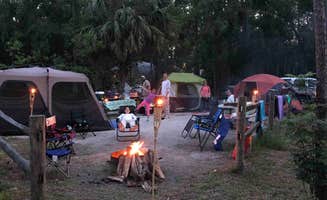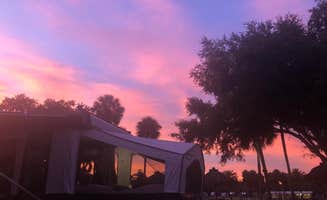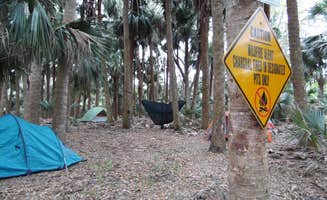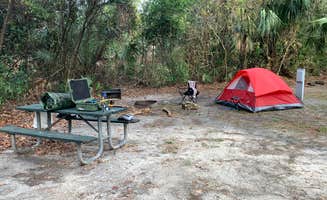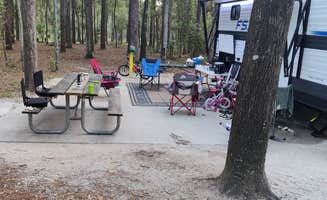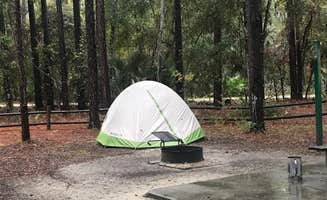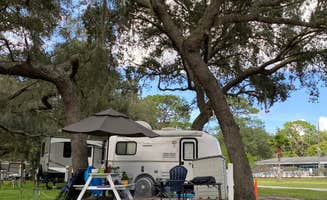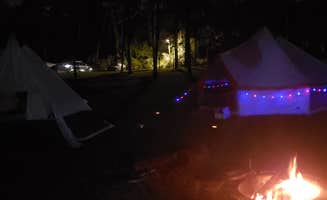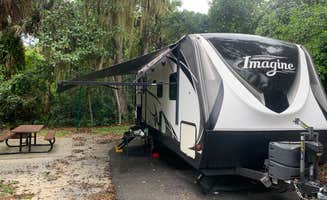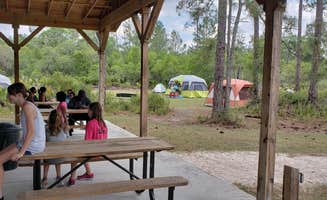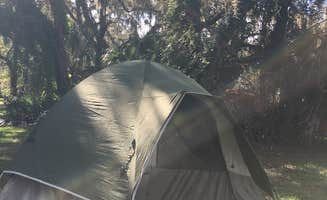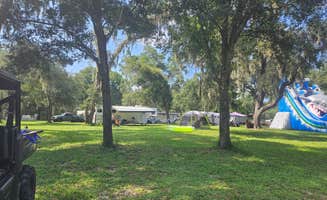Camping spots near Longwood, Florida sit within the St. Johns River watershed, with an average elevation of 72 feet above sea level and yearly rainfall of 52 inches. Most campgrounds in the area are open year-round, though seasonal closures of certain amenities happen during extreme weather events or maintenance periods. Water access is a defining feature of many campsites, from natural springs to river frontage.
What to do
Tubing at Rock Springs: Kelly Park Campground features a natural lazy river with 72°F water year-round. "My partner and I had the pleasure of camping at this park last year. Great spot to have a weekend getaway. If you have no floating tube there is a rental store just down the road from the park," notes Erika P. The park fills quickly during summer months.
Kayaking on multiple waterways: Lake Monroe Park connects to the St. Johns River system with accessible boat launches. "Small park with boat ramp, playground, and bike trails connecting to Gemini Springs," reports Diana F. Sites cost around $25 per night with electric and water hookups.
Wildlife viewing opportunities: Blue Spring State Park becomes a manatee sanctuary during winter months. "Kayaked the river, and even swam with manatees in the spring!!!" shares Anna C. The park enforces no-swimming zones when manatees are present, typically November through February.
Bike trail access: Clarcona Horse Park connects to the West Orange Trail. "Right next to the west orange bike trail," confirms Lisa C. Sites feature cement pads, picnic tables, and grills for $17 per night for campers over 55.
What campers like
Privacy between sites: Wekiva Falls RV Resort offers natural buffers between camping spots. "The campgrounds are very well kept with a fair bit of space and foliage between sites for privacy," writes Megan K. The resort maintains separate camping areas from the main spring recreation zones.
Clean facilities: Trimble Park Campground receives consistent praise for maintenance. "This is the cleanest, well organized park that I have ever stayed at. The bath houses are cleaned properly twice a day," reports Kristi B. The park contains only 15 total sites, with most located directly on the water.
Waterfront camping options: Sites 5-11 at Trimble Park provide direct lake access. "Most of which are waterfront. I stayed in site 11 that was positioned so I had a magnificent view of the lake," shares Ryan S. Several campers mention spotting small alligators from a safe distance at the water's edge.
Natural springs: Multiple campgrounds feature natural springs with consistent 72°F water temperatures. "The springs are beautiful!" notes Jenn B. about Blue Spring State Park. Spring access typically requires short walks from camping areas, with some parks offering paved pathways.
What you should know
Seasonal crowds affect access: Kelly Park Campground often reaches capacity early during summer months. "I saw people waiting at 0245 in the morning to get into the park at 8," warns Steve M. Campsite reservations guarantee park entry even when day-use areas close due to capacity.
Urban noise considerations: Some campgrounds experience traffic, airport, or industrial noise. "Could definitely hear road noise and train noise. I probably would find it too loud for a tent, was not a problem in the camper," explains Justine P. about Lake Monroe Park. Sites farther from entrance roads typically offer less noise exposure.
Advanced reservations required: Trimble Park's limited sites book quickly. "Booking a reservation on a fairly archaic website with a non-sensical process that involves booking 45 days in advance," cautions Stuart K. County-run parks often have different reservation systems than state parks.
Wildlife precautions: Raccoons present challenges at multiple campgrounds. "Beware of the raccoons, they are not afraid to steal your buns right off the picnic table with you sitting there," warns Kristi B. about Trimble Park. Food storage containers are essential at all area campgrounds.
Tips for camping with families
Look for playgrounds: Bill Frederick Park offers extensive play facilities. "This park offers every recreation in the book: boating, fishing, biking, hiking, frisbee golf, wildlife watching (petting farm), jungle gyms," lists Kelsey G. The park charges approximately $25 per day for camping.
Consider weekday visits: Weekend crowds impact experience at most parks. "If you go on a weekend, make sure you go EARLY! Line of car starts around 9am and park will close at capacity," advises Hannah S. about Wekiwa Springs State Park Campground.
Choose accessible facilities: Blue Spring State Park Campground offers accommodation options. "Being handicapped, the springs were a mile from the campground, which is a problem for people having difficulty walking. My husband pushed me there in the wheelchair. Once we got there, Jane, one of the park rangers informed us about the ramp for wheelchairs, and a lift into the water!" shares Lauren W.
Find shade options: Many sites offer natural canopy. "Sites are well maintained. They are close, but there is a lot of vegetation in between. Bathrooms are spotless and cleaned 3x a day," reports Jenn B. about Blue Spring. Shaded sites help manage Florida heat, especially during summer months.
Tips from RVers
Site angles matter: Disney's Fort Wilderness offers excellent amenities but challenging access. "There is not a lot of room in the loops to pull your rv into the spot. There is plenty of room between your rv and your neighbor next to you but not a lot of room across from your spot," explains Samantha O. Many campgrounds suggest disconnecting tow vehicles before backing in.
Water quality varies: Some campgrounds use well water with sulfur content. "The only bad part was the water smelled like sulfur," notes Christy C. about Wekiva Falls. RVers often recommend bringing drinking water or filtration systems.
Dump station logistics: Magnolia Park requires planning for waste disposal. "Sites are paved, with a good amount of privacy. Only complaint was our site was pretty unlevel and we had to max out our Anderson leveling blocks to get it right," shares Scott B. Most parks provide central dump stations rather than site hookups.


